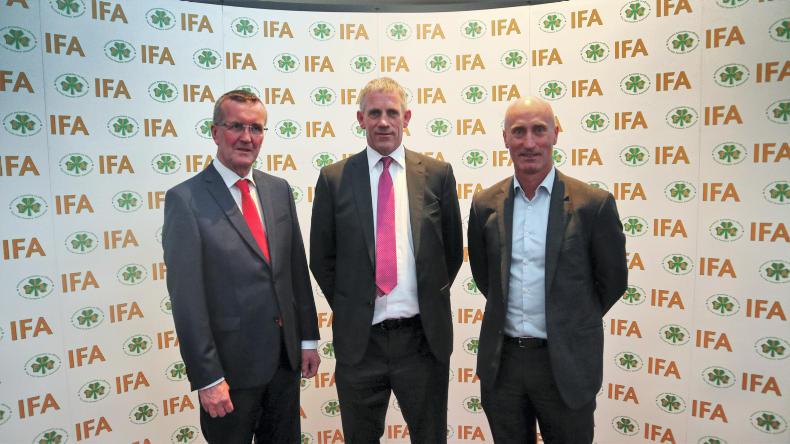“I don’t think I’ve ever seen as low-key an election in Ireland. That’s the case with Donegal, which speaks volumes.” This was Seamus Quinn’s assessment of Tuesday’s IFA presidential hustings in Letterkenny.
Speaking of the disconnect between the members at ground level and IFA leaders, Quinn added: “If we allow this to continue we’ll have a lobby group at every crossroads in the country.”
Around 150 farmers gathered in the Clanree Hotel in Letterkenny on Tuesday night to listen to the candidates for IFA president and vice-president put their cases forward.
“I don’t think I’ve ever seen as low key an IFA election in Ireland, its certainly the case in Donegal. There’s never existed a bigger disconnect, if we allow this to continue there’ll be a lobby group at every cross roads in the country” comments at tonight’s @ifa hustings.? pic.twitter.com/FlGcE4XqJL
— Stephen Robb (@StephenRobbFJ) November 18, 2019
Challenges
All three presidential candidates, Tim Cullinan, Angus Woods and John Coughlan, acknowledged the challenges that the beef protests and new farm groups presented to the IFA’s membership and confidence.
“I think they [new farm organisations] were born out of frustration. We should’ve been looking closer at the livestock sector,” remarked Tim Cullinan of 20,000 out of the IFA’s 72,000 farmer members joining a new group during the past 18 months. Although he did stress that those farmers were still members.
“There’s now seven or eight farmer groups. It’s diluting our power and resources,” he concluded.
Angus Woods drove the message home that he stood by the organisation’s position not to join the beef protests. He explained that due to the impending pressures in the beef market at the time of the protests, blocking factory gates was counter-productive.
“The blockades created a [price] difference and now we’re behind,” Woods remarked, though he did concede that the IFA’s communication on how they came to this decision wasn’t good enough.
John Coughlan also reasserted his position that the decision not to join the protests, and instead go to Europe and lobby for the €100m beef fund, was the right one.
“We did see and understand where it was going to lead, closing the factories when cattle were going over age and there were animals there to be slaughtered,” Coughlan explained.
Tillage
The vice-presidential candidates were questioned by one frustrated member of the audience about the lack of discussion on their positions on the tillage industry.
“We need Teagasc to conduct more research into cultivation systems and see how this can increase our carbon sequestration,” Brian Rushe explained.
He also noted the loss of key products such as chlorothalonil and redigo deter and referred to the hypocrisy of Ireland when importing grain from around the world produced to lower standards.
“We need to keep an open mind on new plant breeding techniques – gene editing is where the future lies for our farmers,” Rushe said, before adding that he feels the IFA needs a strong, clear policy on this.
“We have to keep an open mind about New Plant Breeding Techniques, gene editing is where the future lies for for our farmers”
— Stephen Robb (@StephenRobbFJ) November 18, 2019
Brian Rushe being questioned by Donegal tillage farmers. ?@farmersjournal? pic.twitter.com/KMx6rS4UuP
Thomas Cooney was clear in his position that the three-crop rule should be abolished for Irish tillage farmers. He also noted that convergence is having a particularly negative impact on tillage incomes.
Cooney also felt strongly that any new environmental measure introduced in the CAP must return income to farmers.
Any extra environmental measures will have to mean more money into farmers pockets- Thomas Cooney concluding his pitch to Donegal Farmers here in Donegal. ANC is still a sore spot got some attendees here tonight ?@farmersjournal? pic.twitter.com/Gi2msMAozR
— Stephen Robb (@StephenRobbFJ) November 18, 2019
IFA finances
A question was put the presidential candidates about their views on the state of the organisation’s finances.
As treasurer of the IFA, Cullinan was quick off the mark to explain that the organisation’s budget deficit was brought down from over €1.2m last year to around €200,000 in March of this year.
He pledged to ensure to get the most from his staff and in turn, he feels that farmers wouldn’t mind paying for membership.
"The IFA is like a business. I run the business. If we’re not getting efficiencies from staff, then we have a problem,” Cullinan concluded.
Woods, who was quick to dispel this decrease in budget deficit as the work of the previous treasurer, spoke of the need to cut cloth to measure. He also commented on the importance of a farmer-funded organisational model in order to give the next president the freedom they need to do the job.
Coughlan explained the importance of using the finance to have the right people available to the association. This will partially be done by increasing the number of farmers paying membership, he said.






 This is a subscriber-only article
This is a subscriber-only article










SHARING OPTIONS: